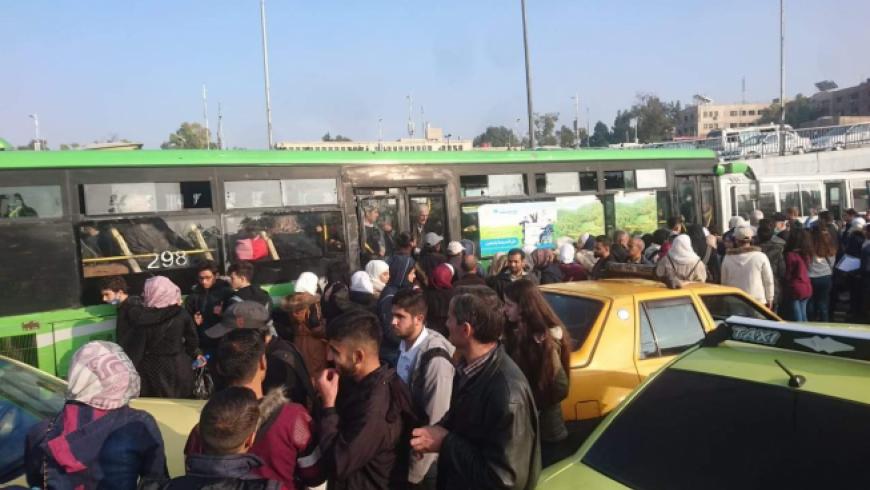“The situation is no longer bearable — it is a deplorable situation, with extreme poverty, and the loss of all basic living standards. In addition, the doors of all countries are closed to us.” This is how Muhammad Sweid described the situation in Damascus, which is inside Syrian regime-controlled areas.
“The situation in Damascus, and I think in all of Syria, is completely crazy. We face darkness, cold, hunger, and broken transportation,” Sweid, a law student, told Syria TV. “There is no movement; everything has reached a standstill and is linked to the US dollar, to the disappearance of fuel, and to the exchange rate that never stabilizes.”
Transportation crisis
Syrian regime-controlled areas are witnessing an economic crisis that increases day by day, amid the failure of the regime’s institutions to secure the daily necessities of citizens such as electricity, transportation and heating, as temperatures drop in December.
With the onset of winter, the fuel crisis increased in Damascus and the rest of the governorates under the regime’s control. The fuel crisis has paralyzed public transport, especially in the capital and its suburbs, in addition to the ongoing service and living crises, without any significant improvement.
In regard to electricity, daily rationing hours reached 21 to 23 hours. Some areas did not have access to electricity for more than a day.
The dramatic collapse in the value of the Syrian pound against the US dollar and other foreign currencies exacerbated the magnitude of suffering, especially since the exchange rate of the US dollar, which reached 5860 pounds on December 6th, negatively affects all prices, especially for food and medicines.
With the regime’s inability to secure diesel and gasoline, the government approved an official holiday on Sunday, December 11 and 18, due to the worsening fuel crisis and the suspension of transportation.
In approving the holiday, the regime’s government said that the decision was taken “in view of the conditions in the oil market due to the blockade and unjust economic sanctions imposed on Syria and because of the circumstances that delayed the arrival of oil products and derivatives.”
The transport crisis significantly impacts the access to education of university students, as well as tens of thousands of employees and teachers.
Sweid believes that the Syrian regime’s government has completely failed to secure the most basic necessities of life. “People do not want to see their children die of hunger and lose their academic future, but what will they do?” he emphasized.
Sweid argued that Syria’s economic crisis would not have worsened to this extent without the massive corruption that pervades all the regime’s institutions and agencies.
This article was translated and edited by The Syrian Observer. The Syrian Observer has not verified the content of this story. Responsibility for the information and views set out in this article lies entirely with the author.


